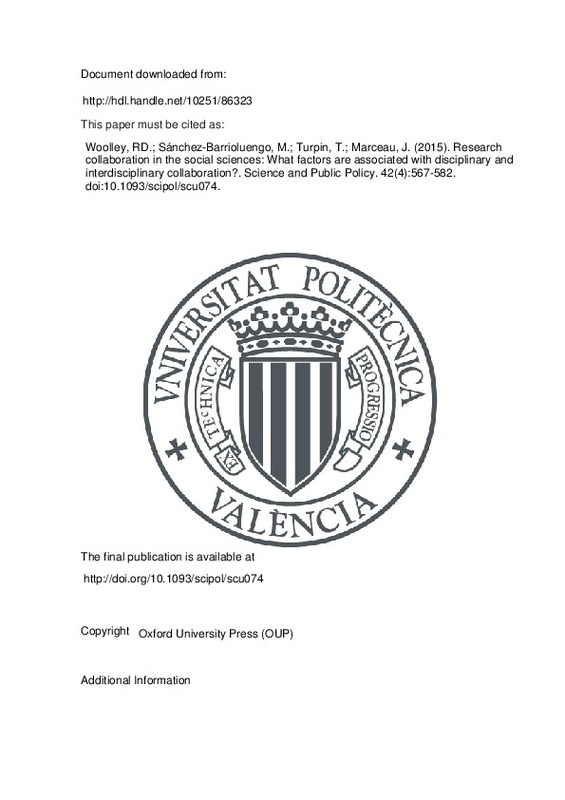JavaScript is disabled for your browser. Some features of this site may not work without it.
Buscar en RiuNet
Listar
Mi cuenta
Estadísticas
Ayuda RiuNet
Admin. UPV
Research collaboration in the social sciences: What factors are associated with disciplinary and interdisciplinary collaboration?
Mostrar el registro sencillo del ítem
Ficheros en el ítem
| dc.contributor.author | Woolley, Richard Derle
|
es_ES |
| dc.contributor.author | Sánchez-Barrioluengo, M
|
es_ES |
| dc.contributor.author | Turpin, Tim
|
es_ES |
| dc.contributor.author | Marceau, Jane
|
es_ES |
| dc.date.accessioned | 2017-09-04T11:30:38Z | |
| dc.date.available | 2017-09-04T11:30:38Z | |
| dc.date.issued | 2015-08 | |
| dc.identifier.issn | 0302-3427 | |
| dc.identifier.uri | http://hdl.handle.net/10251/86323 | |
| dc.description.abstract | [EN] Attention is increasingly directed toward better understanding the factors driving collaborations among researchers, particularly between researchers from different disciplinary backgrounds. This study investigates factors associated with disciplinary and interdisciplinary research collaboration in the social sciences. We utilize data from a survey of Australian-based social scientists. Interdisciplinary collaboration constitutes a considerable proportion of social scientists’ collaboration activity. Factors linked to the duration and diversity of research careers are positively associated with participation in collaborations. Job experience in Australian and foreign universities also boosts total collaboration, while holding an international citizenship increases interdisciplinary collaboration. Interdisciplinary collaborations are also associated with researcher orientation toward applied research activity. Investment in social science research is important for maintaining existing interdisciplinary and applied collaborations, although better information on these collaborations is desirable. Measures to expand such collaborations should take career stage into account. Broad-based population policies may also be an important underlying factor supporting international collaboration. | es_ES |
| dc.language | Inglés | es_ES |
| dc.publisher | Oxford University Press (OUP) | es_ES |
| dc.relation.ispartof | Science and Public Policy | es_ES |
| dc.rights | Reserva de todos los derechos | es_ES |
| dc.subject | Research collaboration | es_ES |
| dc.subject | Social sciences | es_ES |
| dc.subject | Interdisciplinarity | es_ES |
| dc.subject.classification | ESTADISTICA E INVESTIGACION OPERATIVA | es_ES |
| dc.title | Research collaboration in the social sciences: What factors are associated with disciplinary and interdisciplinary collaboration? | es_ES |
| dc.type | Artículo | es_ES |
| dc.identifier.doi | 10.1093/scipol/scu074 | |
| dc.rights.accessRights | Abierto | es_ES |
| dc.contributor.affiliation | Universitat Politècnica de València. Instituto de Gestión de la Innovación y del Conocimiento - Institut de Gestió de la Innovació i del Coneixement | es_ES |
| dc.contributor.affiliation | Universitat Politècnica de València. Departamento de Estadística e Investigación Operativa Aplicadas y Calidad - Departament d'Estadística i Investigació Operativa Aplicades i Qualitat | es_ES |
| dc.description.bibliographicCitation | Woolley, RD.; Sánchez-Barrioluengo, M.; Turpin, T.; Marceau, J. (2015). Research collaboration in the social sciences: What factors are associated with disciplinary and interdisciplinary collaboration?. Science and Public Policy. 42(4):567-582. doi:10.1093/scipol/scu074 | es_ES |
| dc.description.accrualMethod | S | es_ES |
| dc.relation.publisherversion | http://doi.org/10.1093/scipol/scu074 | es_ES |
| dc.description.upvformatpinicio | 567 | es_ES |
| dc.description.upvformatpfin | 582 | es_ES |
| dc.type.version | info:eu-repo/semantics/publishedVersion | es_ES |
| dc.description.volume | 42 | es_ES |
| dc.description.issue | 4 | es_ES |
| dc.relation.senia | 277223 | es_ES |
| dc.identifier.eissn | 1471-5430 |







![[Cerrado]](/themes/UPV/images/candado.png)

